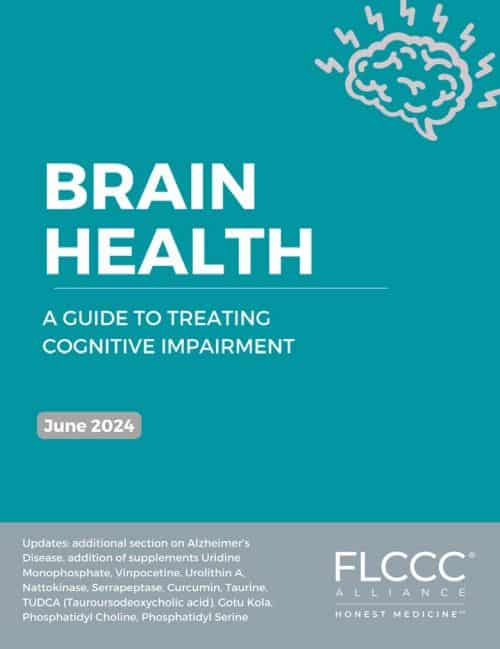Speakers: Dr. Joseph Varon, Dr. Suzanne Gazda
What happens when a landmark Alzheimer’s research paper, once a beacon for advancements in Alzheimer’s, is revealed to be a fraud? That’s the question at the heart of today’s webinar.
This issue was first brought to our attention by Dr. Suzanne Gazda, FLCCC’s Senior Fellow of Neurology, who has made a career helping patients improve brain health and stave off conditions like Alzheimer’s.
There’s been a bit of a shake up in the Alzheimer’s research world recently. The leading study linking amyloid plaque in the brain to Alzheimer’s has been retracted. For the last 20 years, this study has been cited 2500 times in research and drug development. Despite nearly $100 billion invested in Alzheimer’s research in the US, no effective therapy has ever been produced.
The hope for a cure has never been higher. Alzheimer’s disease is diagnosed once every three seconds. Over $1 billion is spent daily on the healthcare of 6.2 million people living with Alzheimer’s. It is the 7th leading cause of death. COVID injections and Long COVID are accelerating the global increase in both Alzheimer’s and other cognitive impairments.

What Causes Alzheimer’s Disease?
Before we explore the flawed research further, it’s crucial to understand the multifaceted causes of Alzheimer’s disease. These include:
- Advancing age
- Vascular disease
- Inflammation (leaky gut, poor oral hygiene, poor diet)
- Poor sleep
- Lack of exercise
- Infections (viruses, Lyme disease, P. gingivalis, syphilis)
- Exposure to toxins (glyphosate, air pollution, heavy metals, chemicals, plastic nanoparticles)
- Loss of trophic support (hormones and key nutrients like B12, zinc, Vitamin D)
- Stress & Trauma
- Cellular deficiencies (limited mitochondrial function, reduced Sirt1)
- Genetics (APOE4 gene)
These factors highlight why it’s misleading to suggest a single pathway or biomarker, such as amyloid plaques, could prevent Alzheimer’s or wholly explain its progression. Naturally, addressing the causes of Alzheimer’s directly is one of the ways to treat it.
🧠 Learn more: Can Alzheimer’s Disease Be Prevented?
The Amyloid Hypothesis
For nearly two decades, the amyloid hypothesis has stood as the cornerstone of Alzheimer’s disease research, supported by the Alzheimer’s Association and numerous disease research centers globally. This hypothesis posits that Alzheimer’s disease results from the accumulation of beta-amyloid plaques, which damage brain cells. However, the retraction of a pivotal 2006 study citing data fabrication has cast a long shadow over this theory, challenging the foundations laid by countless Alzheimer’s and dementia research initiatives.
Dr. Gazda puts it simply, “If we’re going to look for a single molecule to treat complex illness like neurodegenerative disease, we are going to fall short every time.”
Is Amyloid Friend or Foe?
Dr. Gazda’s points out that the story of Amyloid Theory is far from over.
Amyloid-beta, a protein fragment long associated with the pathogenesis of Alzheimer’s, has been considered a neurotoxin that leads to nerve cell death. However, promising research suggests amyloid-beta might also play a protective role against infections and heavy metals. Importantly, the presence of brain amyloid does not correlate directly with cognitive decline, highlighting the complex nature of diagnosing and treating forms of dementia.
Though the research on amyloid continues to evolve, we’ve published a guide to Alzheimer’s that is full of tips to help optimize your brain right now. In other words, don’t wait for the science on amyloid to settle before you start taking care of your brain!
⭐ Brain Health Update: We’ve updated our brainy guide with new info as of June 2024!
Updates include:
- Additional section on Alzheimer’s Disease
- Addition of supplements: Uridine Monophosphate, Vinpocetine, Urolithin A, Nattokinase, Serrapeptase, Curcumin, Taurine, TUDCA (Tauroursodeoxycholic acid), Gotu Kola, Phosphatidyl Choline, Phosphatidyl Serine
Why Does The Flawed Alzheimer’s Research Matter?
There are many downstream difficulties caused by this flawed research:
- Challenges in Clinical Trials for Alzheimer’s: Despite extensive research funding, 99% of clinical trials for Alzheimer’s have failed to produce significant improvements, underscoring the complex biology of the disease and the limitations of current models focusing solely on amyloid plaques and tau.
- Economic Impact of Alzheimer’s Research: The Alzheimer’s drug development pipeline is vigorous, with the Mayo Clinic and other disease research centers investigating over 187 clinical trials aimed at new treatments. Yet, the approval of drugs like Lecanemab shows only modest benefits, reflecting the immense challenge and financial stakes involved in finding an effective treatment.
- Ethical and Scientific Integrity in Research: The retraction of widely cited studies disrupts the Alzheimer’s research community, urging a reassessment of how clinical research is conducted and reported. The involvement of Big Pharma in Alzheimer’s research has often accelerated global investment but also brought scrutiny regarding the influence on clinical trial outcomes and publications.
The Journal of The FLCCC Alliance

Problems like the flawed research described above demonstrate the need for honest, uncompromised scientific research. That’s why the FLCCC Alliance is establishing The Journal of The FLCCC Alliance. This new medical journal is dedicated to maintaining the highest standards of ethical and scientific integrity, free from the influence of big pharmaceutical companies. Stay tuned in the coming months for regular announcements!
What Happens If Clinical Trial Data Cannot Be Trusted?
The crisis in Alzheimer’s research highlights the need for a broadened perspective that encompasses diverse research approaches, including lifestyle choices, early detection, and care and support for caregivers. As we strive to slow the disease and find a treatment, we need to ensure our methods are transparent and reliable. Rest assured, with Dr. Gazda’s watchful guidance, there is hope for a brighter future for those living with dementia.



